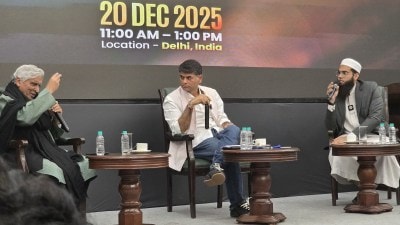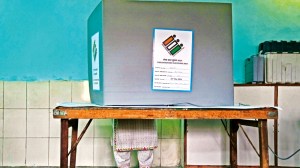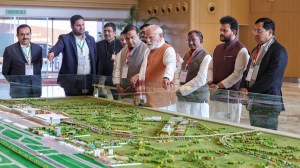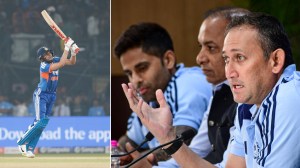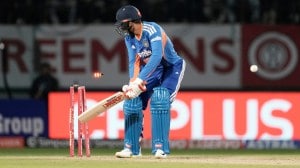Abdulla has said the incident has “deeply affected” him and left him “in a state of shock”, and asked Dhankhar “to take action on the erring personnel and uphold the dignity of Rajya Sabha and its members”.

Opposition MPs amplified Abdulla’s grievance on Wednesday. There has been disquiet among MPs ever since the Parliament complex was brought under a new security regime in May, and the Parliament Security Service (PSS) was replaced by CISF, a Central Armed Police Force under the Union Home Ministry.
What has changed in the security of the Parliament complex and why?
Security responsibilities in the complex were with the PSS and the almost-100-year-old Watch and Ward committee. They had the training and experience required for the specialised job of securing a complex that is packed, when Parliament is in session, with almost 800 MPs, dignitaries, officials, and media personnel with sensitivity and competence.
Several MPs had expressed apprehension when this job passed to an armed force that was originally raised “for the better protection and security of industrial undertakings”. The change was prompted by an extraordinary breach of security at Parliament House on December 13 last year, when two men jumped into the Lok Sabha chamber from the visitors’ gallery and set off smoke canisters.
 M M Abdulla’s letter to Rajya Sabha Chairman Jagdeep Dhankhar (X/Saket Gokhale)
M M Abdulla’s letter to Rajya Sabha Chairman Jagdeep Dhankhar (X/Saket Gokhale)
When and how did the CISF take over security responsibilities in the complex?
This April, CISF personnel replaced the 150 personnel of the Delhi Police who were deployed at the complex alongside the PSS.
On May 13, the office of the Joint Secretary (Security), who heads the PSS, issued an order saying that a letter had been received from the DIG, CISF, that certain duties and facilities “may be handed over to the CISF” by specified dates up to May 20.
Story continues below this ad
This included the checking of passes at the flap gates of all buildings in the complex and anti-sabotage checks; handing over of the dogs of the Dog Squad and control of CCTV control rooms; and control of vehicular access through Parliament’s gates.
 A CISF personnel stands guard outside the Parliament building (Express photo by Amit Mehra)/Inset: M M Abdulla (X/pudugaiabdulla)
A CISF personnel stands guard outside the Parliament building (Express photo by Amit Mehra)/Inset: M M Abdulla (X/pudugaiabdulla)
The CISF’s letter came days after the Home Ministry had appointed a seven-member panel to assess whether the CISF should take over all aspects of security at the complex — from managing security arrangements to issuing passes to regulating the movement of MPs, VIPs, officials, and the media. This committee, headed by CISF DIG Ajay Kumar, was asked to submit its view “at the earliest”.
Is CISF now responsible for the security of the entire Parliament complex?
The list of duties that were to be taken over by the CISF include:
* Central Pass Issuing Cell (CPIC) for both Rajya Sabha and Lok Sabha to issue radio frequency tags for vehicles and verify the character and antecedents of applicants;
* Access regulation for MPs, VIPs, senior government functionaries;
* Positioning of staff at the various gates;
* Regulation and coordination of VIP movement inside the complex;
Story continues below this ad
* Regulation of movement of stores in and out of the complex;
* Maintenance of order in the complex, access control in the lobbies and movement regulation and discipline in the public galleries and press gallery;
* Reception office, issue of temporary passes, and operation of gadgets in the complex;
* Coordination with other security agencies, security arrangements during meetings and conferences, rehearsal of drills, security arrangements during presidential addresses;
Story continues below this ad
* Presidential and vice presidential elections; assistance and protection to the Chair.
Sources said that Parliament Security is currently in charge of lobbies, which include the chambers of Lok Sabha and Rajya Sabha, and the main reception.
How did Watch and Ward and the PSS come to be?
The Watch and Ward Committee was set up on the initiative of Vithalbhai Patel, who was then president (equivalent to today’s Speaker) of the Central Legislative Assembly, the lower house of legislature of British India. This followed the incident of April 8, 1929, when revolutionaries Bhagat Singh and Batukeshwar Dutt threw two feeble bombs and pamphlets in the Central Assembly and raised slogans “to make the deaf hear”.
According to an official document of Parliament, “this incident underlined the need for an exclusive and effective security arrangement for the Assembly” and, on September 3 that year, Patel constituted a committee “to formulate a scheme for creating a security service exclusively for the Central Legislative Assembly”.
Story continues below this ad
The committee opined that a “security service should be created immediately to protect and guard the inner precincts of the Parliament House and to keep a vigil/ watch on the unauthorized activities inside Parliament”. The committee named this organisation ‘Watch and Ward’. The name continued until April 15, 2009, when it was changed to Parliament Security Service.
What was the main job of the PSS?
According to the Sectional Manual of Office Procedure published by the Rajya Sabha Secretariat, “the main responsibility of Parliament Security Service is to provide and maintain Pro-active, Preventive and Protective Security measures within the Parliament House Complex, for safeguarding Members of Parliament, visitors and employees”.
The approach of the PSS “revolves around the principles of Access Control based on proper authorization, verification, identification and authentication of human and material resources entering the Parliament House Complex with the help of modern security gadgets”.
PSS personnel were credited with foiling the December 13, 2001 attack on Parliament. Two PSS personnel — Matbar Singh Negi and Jagdish Prasad Yadav — were killed, along with six Delhi Police personnel and a gardener.
Story continues below this ad
But what was the need to create a separate cadre of personnel for this job?
Officials in Parliament House pointed out that it is important for Parliament to have control over its precincts through a specially trained cadre of its own, which is independent from the control of the executive.
“This is essential to ensure that the government of the day does not limit the access of lawmakers to Parliament, impose its security on Parliament, or put limits on the potential for Parliament to use its own precincts,” a senior Parliament official said.
A Model Law for Independent Parliaments published by the Commonwealth Parliamentary Association in 2020 makes the same point. The Parliament document mentioned above says Watch and Ward was in fact visualised in the 1920s in keeping with the approach of “making Parliament a self-contained and self-sufficient unit under the direct control” of the president of the Central Assembly.
Story continues below this ad
PSS personnel are specially trained to identify MPs and other VIPs. The Manual mentioned above says that with time, the PSS has “acquired specialization in the field of Identification of Members of Parliament and VIPs”.
Article 98 of the Constitution provides for a separate Secretariat of Parliament. Former Lok Sabha Secretary General PDT Achary told The Indian Express: “Parliament security is a part of the Lok Sabha Secretariat and its job is to protect the interest of MPs and facilitate things for them. This cannot be done by any outside security agency that has no experience in dealing with Members of Parliament.”
According to Achary, the PSS “is under the control of the Speaker, and if at all there arises a need to change the composition of the security system, it has to be done under the direction of the Speaker, not by any Ministry”.
Om Birla, Speaker of the 17th Lok Sabha, has said that the security of the Parliament House complex would remain under the control of the Lok Sabha. According to Birla, instead of the multiple agencies that were involved earlier — Delhi Police, CRPF, Lok Sabha’s own security — there would now be a single agency, CISF, which would be accountable to Lok Sabha through the Joint Secretary (Security).



 M M Abdulla’s letter to Rajya Sabha Chairman Jagdeep Dhankhar (X/Saket Gokhale)
M M Abdulla’s letter to Rajya Sabha Chairman Jagdeep Dhankhar (X/Saket Gokhale) A CISF personnel stands guard outside the Parliament building (Express photo by Amit Mehra)/Inset: M M Abdulla (X/pudugaiabdulla)
A CISF personnel stands guard outside the Parliament building (Express photo by Amit Mehra)/Inset: M M Abdulla (X/pudugaiabdulla)
